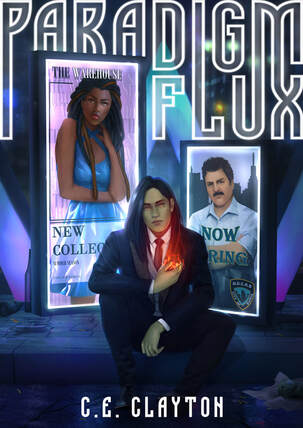 I am a terrible tease. I know that, friends. But I was so focused on Paradigm Flux (which you can get now, huzzah!) that I’ve been pushing back the rest of the teasers for my bigger series… So, I think it’s about time I made good on some of my promises to share more about the next book in Ellinor’s series that will be coming out soon(ish)! I’m going to share a bit of the themes you can expect to see in the next book, as well as show off some of the art, and go into what’s next for Ellinor and her friends, all without spoiling the second or first book, I promise!  In the second book, Ellinor is dealing with some massive consequences from her actions, which really comes as no surprise, that’s pretty much all sequels in a nut shell. But some of those consequences, at least for Ellinor, are internal. Ellinor is being forced to grow and change, which includes her dealing with her prejudices and fears head on, as well as confronting her long-standing grief over her departed husband. Ellinor has to repair her broken relationships, which include her forging new ones, too. But, of course, as new relationships are forged, it also begs the question: who can Ellinor trust? Who will legitimately help? And is Ellinor ready to move forward when it’s easier to stay the same angry person she’s grown so accustomed to? I love a good character driven novel any day of the week, but this wouldn’t be Ellinor if her newest book didn’t also include a lot of action—and lots of colorful swearing, let’s be honest. But, according to my beta readers, this latest book is one of my most cinematic when it comes to the action of this book. For example: choreographed fight arenas housed in rave-like mega clubs. Need I say more? Well, even if I do, I won’t because spoilers. This is in addition to this novel being such an atmospheric read, of course. But, since I shared this on my Instagram feed, here’s a little close up of some of the art that you can expect to see as pre-order bonuses, as well as get in the full color hardcover eventually. Now, in order for Ellinor to do all the above, she’s got to leave Erhard behind. Which means, yes! This book is set in a new location! And, yes! I am sharing the map with you right now for this new place! And while I’m not sharing more than the map (sorry, no title reveals just yet) I can also give you a time-frame for the release of this baby: late Fall. I can say that because I have just gotten the first round of edits back from my editor. However, because this book will go through one more round, plus the cover is still in the works along with a few more pieces of character art (some you can even see right now if you subscribe to my book club!) I can’t be more specific than that. Still, I hope you enjoyed this itsy-bitsy teaser, and I promise: more will be revealed soon!
0 Comments
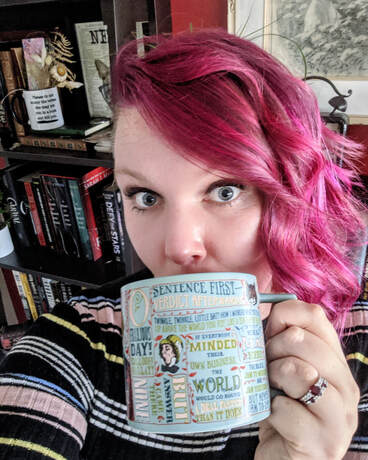 Hello my friends! Since I just finished the first draft of the 3rd book in Ellinor’s series, it seems only appropriate that I talk about some of the struggles of being a writer. Are you surprised that I am not talking about how exciting it is to write THE END on a book? Well, there is a reason for that—that excitement takes a while to come, at least for me. Why? Because there is a lot that happens, emotionally, while writing a book—in any form, first draft, final revisions, publication etc.—and the first sensation after completing a story for me, is one of being absolutely wrecked and drained. Even with that, I’d never want to trade what I do for another career or job. I love my books, the characters I craft, and the worlds they inhabit, but that doesn’t mean that things don’t get difficult. So, as I work through those emotions ahead of starting revisions, allow me to tell you a bit about what I, personally, find the hardest things about being a writer and novelist. 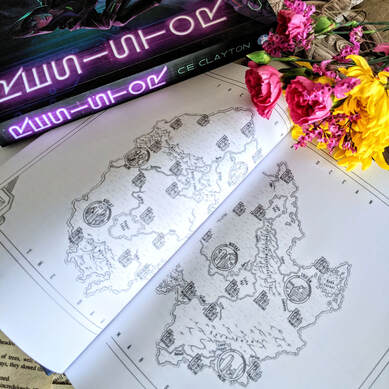 The first thing: the isolation that comes naturally with writing a book. It’s something that you, and you alone, write. Even if a book has co-authors, often the writer of that chapter or that character ends up writing those things alone, working through the problems and plot holes solo. And, for me, I am the only writer in my family, and while some of my family are big readers, reading a book and writing one are very different. It gets hard to be able to tell them my struggles or the things I am trying to do or accomplish in a story, what I should name a book or a character in order to fit a feeling or vibe and asking for help, or why I am so tired when I’ve just been making stuff up all day. They struggle to understand, and they do try, but ultimately, they don’t really “get it” and I get self-conscious about bothering them over something I think they find boring or don’t care about, and I tend to isolate myself from them even further. This gets even worse when I am writing something emotionally devastating. I have to get myself “in the mood” to write certain things or scenes. Sometimes that can be fun if I need to drink some red wine when writing something particularly sexy! But not so much if I have to, let’s just say, killed a character or brake anothers heart and I have to write those scenes where the remaining characters are distraught over the emotional trauma they are enduring. When I get into those scenes, I ultimately pull my emotional heartstrings until I’m in a near depressive state, or worse. Which is not only hard on me, but those in my family who don’t understand how I can get this low over something that I love doing so much. It’s complicated to say the least, and can make me avoid writing for long stretches of time because I just don’t want to do that to myself or the people around me. On the flip side, though, it does work wonders for working through my own shit, so there is a lot of good that can come with this sort of thing, but it’s also a very hard thing to do—both emotionally and mentally just from the pure act of writing something that is, potentially, very dark. 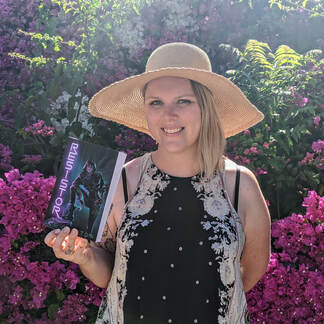 Then, suddenly, the story is done! Hooray! Except, for me, this is the part where my imposter syndrome starts talking the loudest. It tells me things like: this book is trash, I’m not a good enough writer to pull this story off, that I will never think of another story to write again, and the last thing I wrote was as good as I’ll ever get. It takes a lot for me to shut that voice off, unfortunately, which is partially why my books don’t come out all that quickly. I struggle with knowing when the book and story is “good enough”—not just in terms of me editing and revising it, but also knowing when it’s ready for others to read the story. Because then it’s out of my control, and the reader—whether the book is out in the wild or just my beta readers—gets to interpret my words however they want and they can feel something I didn’t intend, which could be a good thing, but it’s also terrifying! It’s usually not until the books is 100% done, as in I’m putting it up for pre-order, when I feel that sense of accomplishment and excitement that makes all the low points worth it (even if you see me “bragging” on social media beforehand on finishing something, that’s mostly just me knowing that it's something I should be doing rather than genuine most of the time). However, other writers may go through a completely different process, and that’s fine and completely true for them, this is just what I go through, personally. Of course, there are other hard parts about being a writer depending on your particular path—finding an agent, getting a cover designer, marketing etc.—but this is more the physical and emotional “hardship”, if you will, of publishing a novel. Authors are emotional, creative people, and we literally pour our heart and soul into our craft, which sometimes means it will take years for a book to be published as we work through all these complex emotions. So, remember to be kind to your friendly neighborhood writers, because even the happiest and sweetest book you read probably took more out of the writer than you may see! 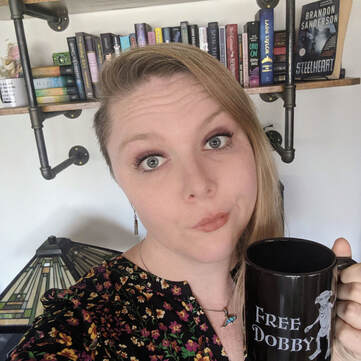 It’s been a minute since I’ve talked about my writing process, friends. I had planned to write about it in November for NaNoWriMo when it felt most appropriate. But I was in the throes of writing my book and getting to that 50k word mark that I just didn’t… And then there was the madness of the holidays and the world in general, and anyway, here we are. So, let me tell you a bit about how I go about writing a first draft of a novel, and what that feels like because it’s such a unique roller coaster that I don’t think many people really understand or appreciate the unique agony that is a first draft. At least for me. Because, and I’ll be honest with you, I hate writing first drafts… 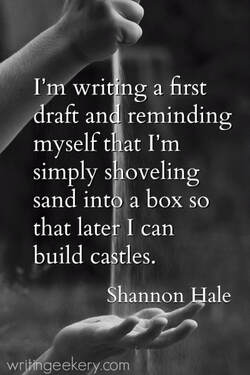 For my Monster of Selkirk series, I edited as I went while I wrote the first draft. Basically, each time I wrote a chapter or a scene, I’d go back and revise and edit until I was happy with the flow, and then move on. That was fine, until I realized that it didn’t actually speed up the revising process. I still had to go back and plug those plot holes and fix those inconsistencies within the story once the book was “done”. And, ultimately, for me, it left me a bit blind to the whole picture of the book and story. So, for my newest series (Ellinor), now that I have grown and learned more as a writer, I only write forward. Writing forward, once I have my super rough outline of where the plot needs to go and where the story ends, is exactly how it sounds: only write forward. No going back to revise or edit as I go. Instead, I take notes in a journal by my desk of the things I need to add, or beef up, or of things I’ve just remembered, so that I can go back during revisions and add them as a cohesive whole. Writing forward is just putting words on a page, crafting the bones of the story so that in revisions, I’m essentially adding the muscle and nervous system, making everything both functional and beautiful. THAT is the part I love most of this process. Not making those bones and just getting the rough story out without worrying about the words I am using to tell the story, but revising and making everything flow, and finding the RIGHT words rather than just any old thing that comes to mind. The reason? It’s that journal I was telling you about. You see, I take A LOT of notes while I write of things that I’ll need to change, add, or remove as I’m writing that first draft. And the more I progress in the story, the higher my word count goes, the more notes I have on each chapter. Just knowing the number of changes I’ll have to make, the things I have to fix… It can get daunting. Ultimately, I KNOW that these things, these notes that I make, will make for a stronger story and a more exciting narrative when it’s all said and done, but until then, these notes of “problems”, if you will, like to rile up my imposter syndrome. The more notes I take, the easier it becomes for that voice in my head that says I’m a fraud and I should just stop, that this book is trash, to get louder and louder. It’s a habit I’m trying to stop, but it does take a lot of mental effort.  All first drafts are rough, no matter the fame of the author, how many books they’ve written, or how old they are. First drafts are never, ever perfect. They are the first ingredient in a recipe. If you were to judge a cake by it’s first ingredient, before it gets baked, then yes, it’ll taste disgusting (also, yes, I’ve stolen this analogy from somewhere…). But no one ever serves a bowl of flour and eggs and calls it a cake, and writing a book is a lot like that. It gets so easy to compare my first draft to another authors finished product, hell, even my previous finished products, and then get depressed because it’s no where near that level of awesome yet. It’s easy to forget that those published books took years to get into the final shape they are in, and even then, there is probably still improvements they could make. So, while I may hate writing first drafts because of my—sometimes toxic—perfectionism, it’s a necessary part of the progression, and I still wouldn’t trade this process, this job, for anything else in the world. So, if you’re a writer and struggling, maybe a look at my process will help. Maybe it’ll help validate that your feelings are normal and it does get better. And if you’re a reader, a fellow booknerd, maybe a little glimpse into this authors world will help you better understand why it takes so damn long for the book you are eagerly waiting for to be born. 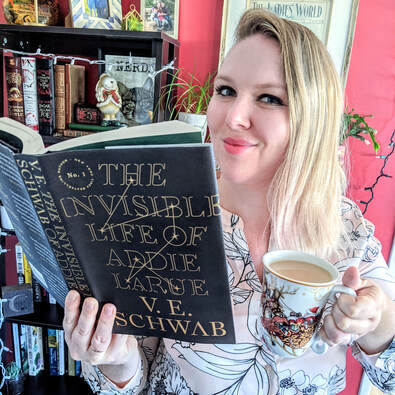 Welcome to 2021, my friends! I know it’s popular to, at the end of the year, to show off your “favorite” lists, but I always hold out hope that something may creep along in those final days to surprise me, so I never like compiling these lists until we’ve officially closed the book (heh) on the year. So, as such, I have my Top 20 from 2020 for you! This isn’t just a book list either, though we will start there. But it also includes some of my favorite bookish shops and artists of the year as well. These are shops and artists I’ve worked with or have purchased from, and while it may be a bit too late for holiday presents to utilize them for, you can now keep them in mind for other gift giving opportunities. Probably ones where they aren’t over burdened with Holiday requests too, which probably works out better for you in the long run, just saying. But, as for the books, there is never a bad time to check out these lovelies! Though I will say that putting together even my modest list of books has shown me just how few 5 star reviews I give out… Maybe 2021 will be the year where that changes? We’ll see! But, until then, please enjoy some of my favorite things from this year. Top 10 Books of 2020 These are all books I have either given 5 stars too, or are a very high 4 star. They range from True Crime, to Science Fiction, to most sub-genres of Fantasy from both mega big authors, and lesser known indies, but all were incredible and were my favorite reads of the year! You can click the link to see the books on Goodreads, and read my reviews at the same time in case you're curious:
Top 5 Bookish Shops
These shops range from coffee, to candles, pins, book merch, and even book boxes! The shops change practically monthly too, which means that they are great any time of the year and not just during seasonal buying periods:
Top 5 Artists You know me, I love having art commissioned for my characters in all my books. These artists are marvelous to work with, and their commissions are either open now, or open periodically throughout the year. They'll even do your favorite character from a book series, DnD character, or even a personal portrait, so even if you don't write books, they can still offer some real works of art for you. Click the link of each artist to see if their style matches the vibe you're looking for, but I've used each artist for my fantasy books, if that helps:  It’s typical in December for people to talk about their favorite gift ideas for the bookworm in your family, or small shops to support. While I can share some of those ideas with you (like give someone the gift of a book box subscription! Use my discount code AUTHOR5 on the Nerdy Book Box today!), I wanted to deviate a little bit. I wanted to talk to you, instead, about a charity that is near and dear to me in case you want to give a different kind of gift this year, or you’re simply looking for new places to give on “Giving Tuesday”. There are so many wonderful charities out there that help with literacy, feeding the hungry, racial justice organizations, preservation groups, you name it! There are so many wonderful causes that always need support, and I encourage you to find a local group you believe in and support them anyway you can, even if it is with your time instead of money. That’s what I have done, and continue to do, with the Best Friends Animal Society.  I know, we always like to joke about how people suck and that dogs are too good for us, but really, sometimes they are. I talk a lot about my eternal writing companion, Dobby, who sits with me all day while I write, who occasionally takes me for walks, and is always down for a good cuddle session. But what I don’t talk a lot about is Dobby’s story. Dobby is a rescue that no one wanted. Chihuahua’s and Pit Bull breeds are some of the most common dog’s in California shelters, so finding homes for these breeds is often difficult, more so when they aren’t puppies. Dobby was in one shelter for too long, and he was scheduled to be put down, when Best Friends Animal Society came in, scooped him up, and put him in another shelter where he could remain until someone adopted him, however long that would take. He wasn’t on the main floor with the other dogs when I arrived, he was too small, too shy to do well in a noisy kennel. So no one saw him. It was by sheer luck that when my husband and I were looking for a dog to adopt, we happened to see his picture on a kiosk in the lobby. He was the most pathetic little buddy imaginable. They put him in a bowtie to try and make him seem fun and cute, but he was just so shy and uncertain; his ears were down, eyes sad, didn’t want to lift his head up. But the shelter brought him out to us, and he was still just this scared little buddy, curious but nervous about approaching us. Until I asked if he wanted to come home with us, and then he crawled into my lap, curled right up, and that was it! He took a little time to fully come out of his shell, but Dobby is such a good little boy that it’s hard to imagine that he was ever abandoned to begin with. He loves my cats, refuses to go on a walk unless my husband walks us to the door, and is so proud of himself when he jumps on the bed and throws all my pillows on the floor.  I am forever appreciative that Best Friends rescued Dobby (he was named Rascal at the time, and he is so not a Rascal that we changed his name) so that I could find him, and give him his forever home. Since then, I have donated to their organization to help them feed and take care of all the pets they have at their shelters. Dobby and I have even participated in one of their 5k walk/run’s to help show off how amazing shelter dogs can be, and I tell anyone who is interested in adding a fur baby to their family to first, check out their local shelter, but if their perfect pet isn’t there, to go to Best Friends. So, if you are looking for a pet this holiday, or looking for places to support, this is a nonprofit that I know, love, and will always support. We adopted Dobby nearly seven years ago and, to this day, it’s still one of the best decisions my husband and I have ever made. |
Archives
April 2023
|
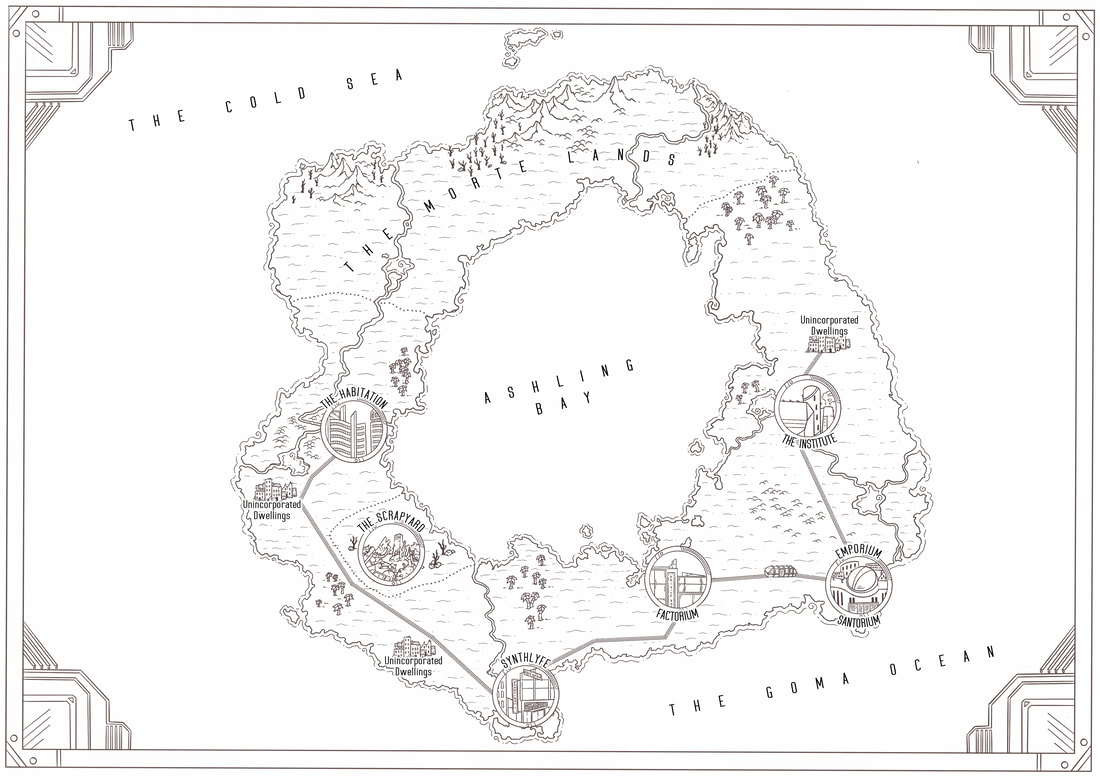
 RSS Feed
RSS Feed